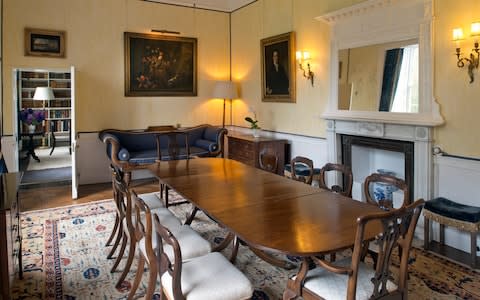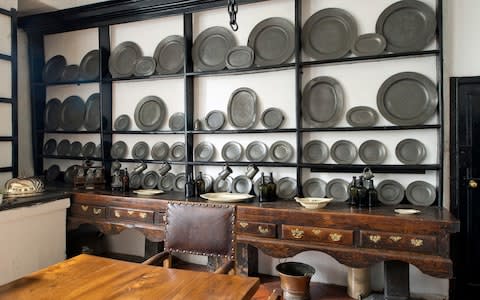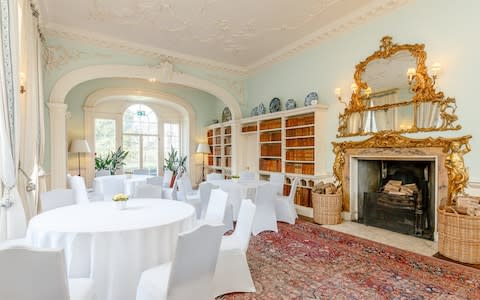Pony rides and a class trip to her own house: meet the woman who grew up in a castle

Aliki Currimjee grew up riding ponies, so she never learnt how to ride a bicycle. It wasn’t until she was 20 that she realised the postman didn’t normally come to the house to collect your letters. When she was at primary school, the class trip was a visit to her house. “Which was mortifying,” she says, “but as the girl that grew up in a castle, I was always slightly different.”
The eldest daughter of Sir Brooke Boothby, the 15th baronet, Currimjee was raised in the small but perfectly formed Fonmon Castle near Barry in South Wales. Built in 1180 by the St John family, it has all the features of a defensive keep – crenellated towers and arrow slits, small, low doors and 6ft-thick stone walls hung with ivy – but inside, it’s cosy.
Standing in 950 acres of land, which includes a working limestone quarry, the Grade I-listed castle hosts around 40 weddings a year. Eight of its 20 rooms, including the library and the drawing room, are open to the public a couple of days a week in the summer, along with the 17th-century kitchen.
Once the biggest private kitchen in Wales, it had a unique method for roasting a joint. “To keep the meat turning evenly and slowly they had a pulley and wheel to which they tied a little dog, who ran around and around until the meat was cooked,” says Currimjee.
With her Mauritian private equity financier husband Riaz and their two children Aian, three, and one-year-old Hugo, Currimjee lives in what she describes as “the flat above the shop”, a five-bedroom apartment where she grew up. “It was lovely,” she says of her childhood.

“There was always somebody to play with. I’d get up early and feed the lambs with my grandmother, who also lived with us… My sister and I were let loose because there was always a pair of eyes watching us. Mum would come out at the end of the balcony and holler at meal times, so we’d only go in when we were hungry.”
She always knew she’d inherit the castle, which her father handed over to her in 2013, presenting the key on a cushion placed on a silver platter following a family Christmas dinner.
When she was 13 she hadn’t been so keen, having a “bit of a wobble” over the prospect of shouldering such a responsibility. “I said, ‘I don’t want to do this, I can’t do it, it’s too much’. I would have daydreams about living in a ‘normal’ Victorian semi in a quiet street, not a lunatic asylum with family, friends, animals and everything else going on. But it was just the desire of a teenager to conform.”
She always knew she’d inherit the castle, which her father handed over to her in 2013, presenting the key on a cushion placed on a silver platter following a family Christmas dinner
She’s grateful for the fact that she had a life before taking over – something her father was unable to have, as at 24 he was forced to return home after his own father fell ill. Currimjee, however, studied law at Exeter, and carved out a successful career at Yahoo and Microsoft.
The one thing she hasn’t inherited is the title, due to the fact she is a woman. “The feminist side of me thinks it’s ridiculous. A woman is just as capable of running any size of house, just the same as a man, so why shouldn’t she carry the title?”
She has taken on her husband’s Mauritian surname which, she says, leads to some confused visitors. “Sometimes the odd visitor turns up and is chuffed to see Sir Brooke Boothby and less chuffed to see me. They want to see the Lord of the Manor, and I always get the question, “Is Sir Brooke about?’ The last time he was so scruffy he masqueraded as the gardener!”

The castle first came into Currimjee’s family in 1656, when it was bought by their ancestor Col Philip Jones, Oliver Cromwell’s right-hand man. As Cromwell’s chief adviser on Welsh affairs he was “de facto ruler of South Wales”, and organised his funeral.
Her ancestor, Robert Jones III, who inherited the property in 1760, was responsible for transforming the cold, dark, defensive building into a gentleman’s residence. Using his wife’s money – “he married a local heiress and went on a huge spending spree” – he installed tall sash windows and panelling in the rooms, knocked walls down to create a huge, double height hallway and employed a famous local plasterer, Thomas Stocking, to create rococo ceilings.
Her own parents redecorated in 1976, including the vibrant orange hallway, which was painted in homage to the décor of Woburn Abbey, the family seat of Aliki’s mother, Georgiana. According to family myth, her parents painted in the nude after getting too much orange on their clothes. “I don’t know if it’s true but it was the Seventies, so it could be.”

She, in turn, modernised her living quarters when she took over, and now divides her time between Fonmon and her other family home in Shepherd’s Bush, London. She runs the property with her father, who lives nearby. They spend around £120,000 a year on maintenance and there is always something to do.
“It’s everything from a bride asking for indoor fireworks to redecorating the ladies’ loo or fixing a leak,” she says.
“An owl recently fell down the chimney and was loose in the library. The plasterwork is quite delicate and our housekeeper is petrified of birds. So she was screaming her head off and we were desperately trying to stop it from pooing all over the books.”
It is because of the high level of work required to keep the castle going that the family made the difficult decision to put it on the market.

Sir Brooke is 70 next year and “deserves a retirement”, while Currimjee can no longer juggle the commute from London with two small children. “We came to the fundamental question of ‘What are we doing? And why are we doing it?’” she says. “It’s immensely sad. I feel a wave of disapproval coming off the portrait of Col Jones. He’s looking at me thinking, ‘What have you done?’”
The sadness is partly one of nostalgia for a home that no longer exists. “The house in which Dad and I grew up gave us a carefree life, running around. My children have been relegated to a little corner of the vegetable patch because everything’s laid out for weddings to look beautiful. There’s no running around and shrieking because a bride is getting married upstairs.”
It is a huge loss. “I’ll miss it very much. As the possibility of it going gets closer, and you realise you’re going to lose something, you suddenly get terribly fond of it.”
She’s not quite stroking the walls yet but, “give me a couple of months, and I will be”. It is on the market for £11.5 million with Savills.

 Yahoo Finance
Yahoo Finance 